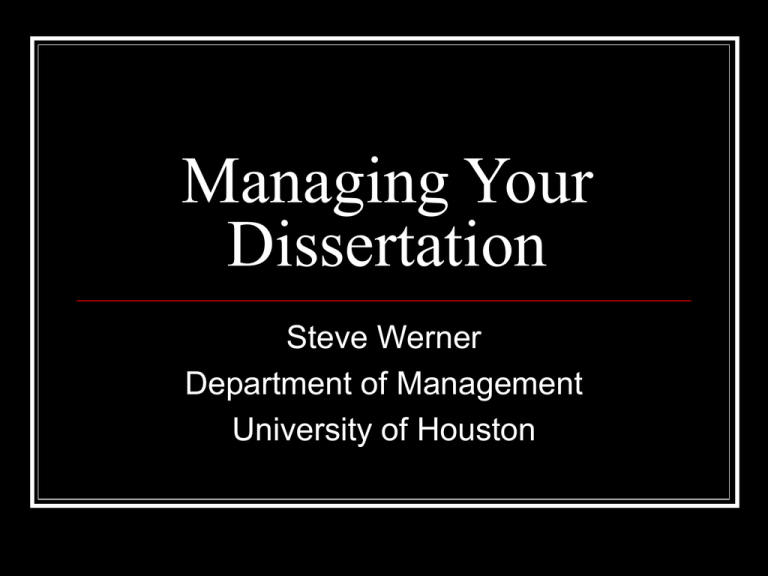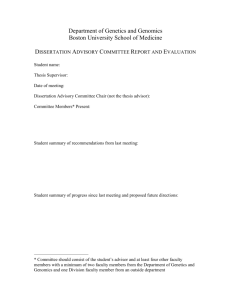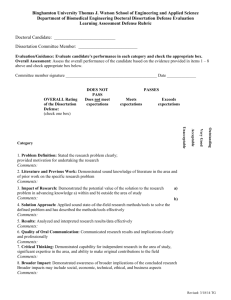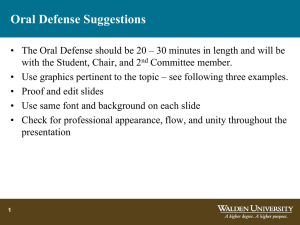Ph.D - University of Houston
advertisement

Managing Your Dissertation Steve Werner Department of Management University of Houston Overview Critical Early Choices Working with the Committee The Proposal The Proposal Defense The Research The Defense The Paper Critical Early Choices The Chair The Committee The Topic Choosing the Chair Someone you can work with. Someone who can help you. Averting disaster. Someone You Can Work With Someone you’ve worked with in the past. Someone you respect. Someone you like. Someone who compliments your personality. Someone who supports your goals. Someone whose ground rules you can live with. Ground Rules Division of labor. Level of involvement. Schedules. Turnaround time. Length. Publications. Expectations. Someone Who Can Help You Someone who knows the field. Someone who knows research methods. Someone who can publish. Someone who can help you get a job. Someone who can control the committee. Averting Disaster Know the policies. Avoid the untenured. Avoid the malcontents. Avoid the roamers. Avoid surprises. Choosing the Committee Give input to the chair. Faculty who can help. Keep the committee balanced. Faculty who can work together. Faculty who you can work with. Faculty who can be supportive. Faculty who can be controlled. Choosing the Topic Work with the chair. Work with committee members who can help. Choose something you are interested in. Don’t choose something your are overly emotionally invested in. Is it manageable? Avoid dead-end topics. Working with the Committee Do what they say. Follow policies. Be enthusiastic Be honest. Be independent. Be disciplined. The Proposal Know the policies. Know the expectations. Get buy-in from all. Ask for permission to defend. The Proposal Defense Make it easy for everyone. Be professional. Listen, acknowledge and use comments. Don’t dig in. Defer to the chair. The Research Be structured. Be efficient. Be focused. Be motivated. Be professional. Be Structured Create a time line with plenty of padding. Follow policies. Follow the ground rules. Break it up into manageable parts. Get something done every day. Be Efficient Do what they said to do. Work how, when, and where you work best. Procrastinate by working on other parts. Back up everything regularly. Only include what is relevant. Be Focused Prioritize the dissertation as first. Don’t take a job without finishing. Take mental health breaks when deserved. Keep stress under control. Catch self-destructive behavior before its too late. Be Motivated Go to conferences and talk with others. Discuss your work with non-academics. Use expectancy theory. Use reinforcement theory. Be Professional Do not give the committee working drafts to read. Be loyal. Be politically astute. Be respectful. The Defense Get buy-in from all. Ask for permission to defend. Know the expectations. Expect revisions. Don’t be arrogant or presumptive. Know your dissertation. Be confident and poised. Rehearse The Paper Learn from job talks. Start right away. Don’t expect much help. Keep good notes. Get help on the revision. Conclusion Critical Early Choices Working with the Committee The Proposal The Proposal Defense The Research The Defense The Paper Celebrate References Ahern, K., & Manathunga, C. 2004. Clutch-Starting Stalled Research Students, Innovative Higher Education., 28: 237-254. Carlin, D.B., & Perlmutter, D.D. 2006. Advising the New Advisor, Chronicle of Higher Education, September 8. Mendenhall, M. 1983. Overcoming Obstacles in the Dissertation Requirement: Advice to the Doctoral Candidate, Teaching of Psychology, 10: 210-212. Messner, M.A. 2005. Besides, I Just Don’t Like You, Chronicle of Higher Ed., May 20. Perlmutter, D.D. 2006. Betrayed by Your Advisor, Chronicle of Higher Ed., February 24. Schiff, F., & Ryan, M. 1996. Ethical Problems and Advising Theses and Dissertations, Journalism and Mass Communication Educator: 23-35. Spillett, M.A., & Moisiewicz, K.A. Cheerleader, Coach, Counselor, Critic: Support and Challenge Roles of the Dissertation Advisor, College Student Journal, 38: 246-256. Tanner, M.W. Great Expectations: Tips for a Successful Working Relationship with your Thesis Advisor, College Student Journal: 635-644. Wesley, P. 2006. Review Blasts Professors for Plagiarism by Graduate Students, Chronicle of Higher Education, June 16: 13. Wisker, G. 2005. The Good Supervisor. New York, NY: Palgrave MacMillan.





